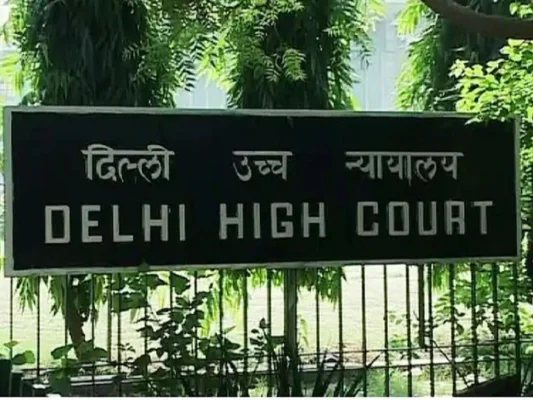इलाहाबाद उच्च न्यायालय ने हाल ही में 628.28 किलोग्राम गांजा की तस्करी के आरोपी एक व्यक्ति को जमानत दे दी है।
न्यायाधीश न्यायमूर्ति चंद्रधारी सिंह ने नारकोटिक ड्रग्स एंड साइकोट्रोपिक सब्सटेंस एक्ट, 1985 (एनडीपीएस एक्ट) की धारा 8 और 20 के तहत दर्ज एक राजवीर सिंह को जमानत दे दी।
याचिकाकर्ता को जमानत देते हुए अदालत ने कहा कि न तो आवेदक का नाम प्रथम सूचना रिपोर्ट (एफआईआर) में है और न ही उससे कोई मादक पदार्थ बरामद किया गया है।
इसके अतिरिक्त, न्यायालय ने पाया कि आवेदक के खिलाफ मामला केवल एनडीपीएस अधिनियम की धारा 67 के तहत दर्ज सह-अभियुक्तों के इकबालिया बयानों के आधार पर था और आरोपों को साबित करने के लिए कोई अन्य पर्याप्त सबूत सामने नहीं रखा गया था।
केस विवरण-
पृष्ठभूमि के अनुसार उड़ीसा से झांसी, उरई, कानपुर, लखनऊ होते हुए अलीगढ़ जा रहे मादक पदार्थों से लदे ट्रक की विशेष सूचना मिलने पर राजस्व खुफिया निदेशालय के अधिकारियों की टीम गठित की गयी।
इसे रोका गया और ट्रक में सवार दो लोगों को पकड़ लिया गया।
उन्होंने शुरू में ट्रक में प्रतिबंधित सामग्री के बारे में अनभिज्ञता जताई, लेकिन पूछताछ के बाद उन्होंने तलाशी दल को सूचित किया कि ट्रक में गांजा था।
ट्रक की तलाशी लेने पर ट्रक में विशेष गड्ढा मिला जहां से करीब 628.28 किलोग्राम गांजा बरामद हुआ।
पकड़े गए दोनों व्यक्तियों द्वारा इकबालिया बयान दिए जाने के बाद वर्तमान आवेदक का नाम प्रकाश में आया। बाद में, आवेदक ने एनडीपीएस अधिनियम की धारा 67 के तहत दिए गए अपने बयान में यह भी स्वीकार किया कि उसने अपने पैसे से जब्त प्रतिबंधित पदार्थ खरीदा है।
कोर्ट ने इस बात का संज्ञान लिया कि प्राथमिकी में न तो आवेदक-आरोपी का नाम था और न ही वह मौके पर मौजूद था। इसके अलावा, आरोपी-आवेदक से कोई वसूली नहीं की गई थी।
अदालत ने कहा कि उसका नाम एनडीपीएस अधिनियम की धारा 67 के तहत दर्ज सह-आरोपी राकेश और वीरपाल के इकबालिया बयानों के आधार पर सामने आया, जिसमें कहा गया था कि वे आरोपी आवेदक के निर्देश पर जब्त गांजा को अलीगढ़ ले जा रहे थे।
इसके अलावा, एनसीबी ने स्वयं आवेदक के बयान पर एनडीपीएस अधिनियम की धारा 67 पर भी भरोसा किया था। लेकिन कोर्ट ने कहा कि सुप्रीम कोर्ट द्वारा निर्धारित कानून आरोपी की मदद के लिए आएगा।
8. The expression ‘reasonable grounds’ has not been defined in the N.D.P.S. Act, but the Apex Court in the case of Union of India Vs. Rattan Mallik @ Habul, 2009 (1) SCC (Crl) 831, has settled the expression “reasonable grounds”
इस प्रकार, उच्च न्यायालय ने माना कि मुकदमे के दौरान पेश किए गए सबूतों की गुणवत्ता के आधार पर आवेदक की जटिलता का निर्धारण करना होगा।
अदालत ने कहा, “जहां तक स्व-अपराधी बयान पर भरोसा है, यह अदालत प्रथम दृष्टया राय है कि तोफान सिंह के मामले में निर्धारित अनुपात आवेदक की सहायता के लिए उसे नियमित जमानत का लाभ देने के लिए आएगा।”
- A Division Bench of Hon’ble Supreme Court in Tofan Singh Vs. State of Tamil Nadu (2013) 16 SCC 31 while discussing the ratio laid down in decisions of Raj Kumar Karwal Vs. Union of India (1990) 2 SCC 409 and Kanhiyalal Vs. Union of India (2008) 4 SCC and certain other judgments observed that the ratio laid down in the case of Kanhiyalal Vs. Union of India (supra) is required to be re-looked and thus, referred the matter to a Larger Bench. The matter was referred to a Larger Bench of three judges, who culled out following two issues for determination:-
“1. Whether an officer “empowered under Section 42 of the NDPS Act” and/or “the officer empowered under Section 53 of the NDPS Act” are “Police Officers” and therefore, statements 4 of 7 recorded by such officers would be hit by Section 25 of the Evidence Act; and What is the extent, nature, purpose and scope of the power conferred under Section 67 of the NDPS Act available to and exercisable by an officer under Section 42 thereof, and whether power under Section 67 is a power to record confession capable of being used as substantive evidence to convict an accused.”
The Larger Bench in its judgment has concluded in para 152 that “a confessional statement made before an officer designated under Section 42 or Section 53 can be the basis to convict a person under the NDPS Act, without any non obstante clause doing away with Section 25 of the Evidence Act, and without any safeguards, would be a direct infringement of the constitutional guarantees contained in Articles 14, 20 (3) and 21 of the Constitution of India.” It was further held that the judgments rendered in Kanhiyalal and Raj Kumar Karwal do not state the correct law and thus overruled. The reference was
therefore answered by stating:-
“(i) That the officers who are invested with powers under Section 53 of the NDPS Act are “police officers” within the meaning of Section 25 of the Evidence Act, as a result of which any confessional statement made to them would be barred under the provisions of Section 25 of the Evidence Act, and cannot be taken into account in order to convict an accused under the NDPS Act.
(ii) That a statement recorded under Section 67 of the NDPS 5 of 7 Act cannot be used as a confessional statement in the trial of an offence under the NDPS Act.”
कोर्ट ने आगे कहा कि यद्यपि सह-अभियुक्त ने कहा कि जब्त किया गया ट्रक आवेदक का है, अभियोजन पक्ष जब्त वाहन के संबंध में आवेदक-अभियुक्त के स्वामित्व को स्थापित करने के लिए कोई दस्तावेजी साक्ष्य रिकॉर्ड में लाने में विफल रहा।
अंत में, आवेदक को जमानत देते हुए, अदालत ने कहा कि एनडीपीएस अधिनियम की धारा 37 के संदर्भ में यह मानने के लिए उचित आधार हैं कि आवेदक आरोपी अपराध का दोषी नहीं है और जमानत पर रहते हुए उसके कोई अपराध करने की संभावना नहीं है।
मुझे लगता है कि यह आवेदक को जमानत देने के लिए उपयुक्त मामला है। Accordingly, the bail application is allowed.
Case Title- Rajveer Singh vs Union of India
BAIL No. – 6782 of 2019













